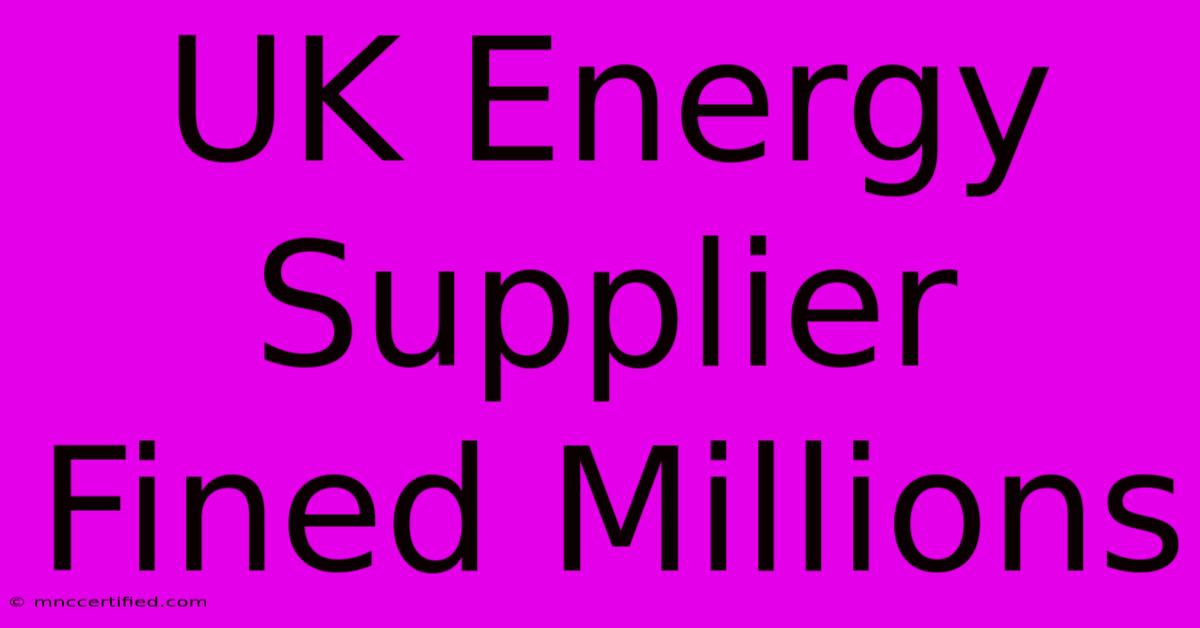UK Energy Supplier Fined Millions

Table of Contents
UK Energy Supplier Fined Millions: A Case Study in Regulatory Failures
The UK energy market has faced intense scrutiny in recent years, with several suppliers facing hefty fines for various regulatory breaches. This article delves into a recent case where a UK energy supplier was fined millions, analyzing the reasons behind the penalty, the implications for consumers, and the wider impact on the industry's reputation. We'll explore the specifics of the case, examining the regulatory body's role and the potential for future reforms.
The Scale of the Fine and the Offences Committed
[Insert Name of Energy Supplier] recently received a multi-million pound fine from [Name of Regulatory Body, e.g., Ofgem] for [Clearly state the specific offenses, e.g., mis-selling energy contracts, inaccurate billing practices, failure to comply with customer service standards, etc.]. The exact amount of the fine was [Insert Amount] – a significant sum reflecting the seriousness of the infractions. The investigation revealed a pattern of [Explain the pattern of wrongdoing. Be specific, using data and examples where possible. E.g., "systematic overcharging of vulnerable customers," "deliberate obfuscation of contract terms," etc.].
Key Violations and their Impact on Consumers
The supplier's violations had a demonstrably negative impact on thousands of consumers. This included:
- Financial losses: Many customers experienced significant financial losses due to [Explain the financial consequences, e.g., inflated bills, incorrect charges, etc.].
- Damaged trust: The supplier's actions severely eroded consumer trust in the energy market, leading to increased cynicism and anxiety around energy contracts.
- Service disruptions: Customers reported difficulties contacting customer service, experiencing lengthy wait times, and receiving inadequate responses to their concerns.
The Regulatory Response: Holding Suppliers Accountable
[Name of Regulatory Body] acted swiftly to investigate the complaints and imposed the substantial fine. This action highlights the regulatory body's commitment to protecting consumers and upholding high standards within the energy sector. The investigation involved [Explain the investigation process: Number of complaints received, methods of investigation, etc.]. The detailed findings of the investigation are available on the [Name of Regulatory Body]'s website [insert link if available, otherwise omit].
The Role of the Regulatory Body in Protecting Consumers
The regulatory body plays a crucial role in safeguarding consumer interests within the competitive energy market. This case demonstrates the importance of robust regulatory oversight to:
- Prevent market abuse: The fine serves as a deterrent to other suppliers considering similar practices.
- Promote fair competition: By punishing unethical behaviour, the regulator helps to create a level playing field for all energy suppliers.
- Enhance consumer confidence: Effective regulatory action helps to restore trust in the energy market, encouraging consumer participation and transparency.
The Implications for the Energy Sector and Future Reforms
This case has raised serious questions about the effectiveness of current regulatory frameworks and the need for further reforms. Suggestions for improvement include:
- Strengthening consumer protection laws: A review of existing legislation might be necessary to enhance protections for vulnerable consumers.
- Improving regulatory enforcement: More robust enforcement mechanisms could be implemented to ensure compliance with regulations.
- Increased transparency and accountability: Greater transparency in pricing and contract terms could empower consumers to make informed decisions.
- Enhanced customer service standards: Minimum service standards could be introduced to ensure better customer experience.
This significant fine serves as a stark reminder of the crucial role of regulatory bodies in maintaining ethical standards within the UK energy sector. The case underscores the importance of robust oversight to protect consumers and promote a fair and transparent energy market. It also highlights the need for continuous improvements in regulatory frameworks to adapt to the evolving challenges of the industry. Further investigation into similar practices across other energy suppliers is crucial to prevent future occurrences.

Thank you for visiting our website wich cover about UK Energy Supplier Fined Millions. We hope the information provided has been useful to you. Feel free to contact us if you have any questions or need further assistance. See you next time and dont miss to bookmark.
Featured Posts
-
Rooneys Post Retirement Lifestyle Food And Drink
Nov 22, 2024
-
Julian Lewiss Colorado Commitment
Nov 22, 2024
-
Gaetz Withdraws Ag Bid Amidst Sexual Allegations
Nov 22, 2024
-
Sales Return Braves Pitcher Triumphs
Nov 22, 2024
-
Horse Insurance For Older Horses
Nov 22, 2024